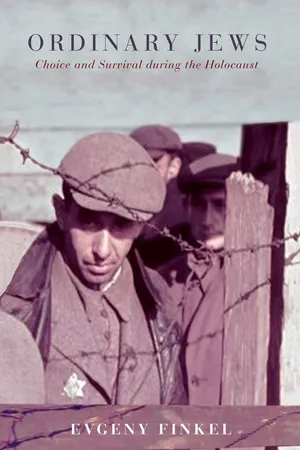
- 296 pages
- English
- ePUB (mobile friendly)
- Available on iOS & Android
About this book
How Jewish responses during the Holocaust shed new light on the dynamics of genocide and political violence
Focusing on the choices and actions of Jews during the Holocaust, Ordinary Jews examines the different patterns of behavior of civilians targeted by mass violence. Relying on rich archival material and hundreds of survivors' testimonies, Evgeny Finkel presents a new framework for understanding the survival strategies in which Jews engaged: cooperation and collaboration, coping and compliance, evasion, and resistance. Finkel compares Jews' behavior in three Jewish ghettos—Minsk, Kraków, and Bia?ystok—and shows that Jews' responses to Nazi genocide varied based on their experiences with prewar policies that either promoted or discouraged their integration into non-Jewish society.
Finkel demonstrates that while possible survival strategies were the same for everyone, individuals' choices varied across and within communities. In more cohesive and robust Jewish communities, coping—confronting the danger and trying to survive without leaving—was more organized and successful, while collaboration with the Nazis and attempts to escape the ghetto were minimal. In more heterogeneous Jewish communities, collaboration with the Nazis was more pervasive, while coping was disorganized. In localities with a history of peaceful interethnic relations, evasion was more widespread than in places where interethnic relations were hostile. State repression before WWII, to which local communities were subject, determined the viability of anti-Nazi Jewish resistance.
Exploring the critical influences shaping the decisions made by Jews in Nazi-occupied eastern Europe, Ordinary Jews sheds new light on the dynamics of collective violence and genocide.
Frequently asked questions
- Essential is ideal for learners and professionals who enjoy exploring a wide range of subjects. Access the Essential Library with 800,000+ trusted titles and best-sellers across business, personal growth, and the humanities. Includes unlimited reading time and Standard Read Aloud voice.
- Complete: Perfect for advanced learners and researchers needing full, unrestricted access. Unlock 1.4M+ books across hundreds of subjects, including academic and specialized titles. The Complete Plan also includes advanced features like Premium Read Aloud and Research Assistant.
Please note we cannot support devices running on iOS 13 and Android 7 or earlier. Learn more about using the app.
Information
Table of contents
- Cover Page
- Title Page
- Copyright Page
- Contents
- List of Tables, Maps, and Figures
- Note on Transliteration
- Chapter 1: Introduction
- Chapter 2: Setting the Stage: Jewish Ghettos during the Holocaust
- Chapter 3: What Did the Jews Know?
- Chapter 4: Cooperation and Collaboration
- Chapter 5: Coping and Compliance
- Chapter 6: Evasion
- Chapter 7: Resistance
- Chapter 8: Conclusions
- Appendix 1: Data and Archival Methods
- Appendix 2: Distribution of Strategies
- Appendix 3: Beyond the Three Ghettos: Econometric Analysis of Uprisings
- Notes
- Abbreviations
- Bibliography
- Glossary
- Acknowledgments
- Index